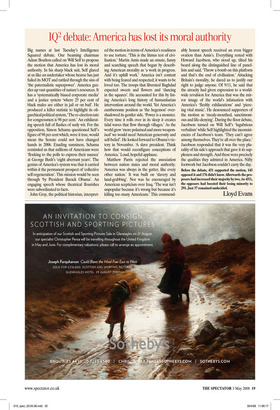IQ 2 debate: America has lost its moral authority Big names
at last Tuesday’s Intelligence Squared debate. Our beaming chairman Adam Boulton called on Will Self to propose the motion that America has lost its moral authority. In his sharp black suit, Self glared at us like an undertaker whose hearse has just failed its MOT and rattled through the sins of ‘the paternalistic superpower’. America guzzles up vast quantities of nature’s resources. It has a ‘systematically biased corporate media’ and a justice system ‘where 25 per cent of black males are either in jail or on bail’. He produced a killer statistic to highlight its oligarchical political system, ‘The re-election rate for congressmen is 98 per cent.’ An exhilarating speech full of flashes of surly wit. For the opposition, Simon Schama questioned Self’s figure of 98 per cent which, were it true, would mean the Senate could not have changed hands in 2006. Exuding sunniness, Schama reminded us that millions of Americans were ‘flocking to the polls to express their nausea’ at George Bush’s ‘eight aberrant years’. The genius of America’s system was that it carried within it the permanent prospect of ‘collective self-regeneration’. This mission would be seen through ‘by President Barack Obama’. An engaging speech whose theatrical flourishes were subordinated to facts.
John Gray, the political historian, interpret ed the motion in terms of America’s readiness to use torture. ‘This is the litmus test of civilisation.’ Martin Amis made an ornate, funny and searching speech that began by describing American morality as ‘a work in progress. And it’s uphill work.’ America isn’t content with being feared and respected; it wants to be loved too. The troops that liberated Baghdad expected sweets and flowers and ‘dancing in the squares’. He accounted for this by listing America’s long history of humanitarian intervention around the world. Yet America’s cumbersome position as ‘the hegemon’ overshadowed its gentler side. ‘Power is a monster. Every time it rolls over in its sleep it creates tidal waves that flow through villages.’ As the world grew ‘more polarised and more weaponised’ we would need ‘American generosity and self-belief’. He looked forward to Obama’s victory in November. ‘A slave president. Think how that would reconfigure conceptions of America.’ Loud, hopeful applause.
Matthew Parris rejected the association between nation states and moral authority. ‘America was always in the gutter, like every other nation.’ It was built on ‘slavery and land-grabbing’. Nor was he encouraged by American scepticism over Iraq. ‘The war isn’t unpopular because it’s wrong but because it’s killing too many Americans.’ This commend ably honest speech received an even bigger ovation than Amis’s. Everything rested with Howard Jacobson, who stood up, tilted his beard along the distinguished line of panellists and said, ‘Throw a bomb on this platform and that’s the end of civilisation.’ Attacking Britain’s morality, he dared us to justify our right to judge anyone. Of 9/11, he said that the atrocity had given expression to a worldwide revulsion for America that was the mirror image of the world’s infatuation with America’s ‘fleshly exhilarations’ and ‘piercing vital music’. He denounced supporters of the motion as ‘mealy-mouthed, sanctimonious and life-denying’. During the floor debate, Jacobson turned on Will Self’s ‘lugubrious verbalism’ while Self highlighted the inconsistencies of Jacobson’s team. ‘They can’t agree among themselves. They’re all over the place.’ Jacobson responded that it was the very plurality of his side’s approach that gave it its suppleness and strength. And these were precisely the qualities they admired in America. Nifty footwork but Jacobson couldn’t carry the day.
Before the debate, 431 supported the motion, 143 opposed it and 176 didn’t know. Afterwards the proposers had increased their majority by two, (to 433), the opposers had boosted their losing minority to 291. Just 37 remained undecided.
Lloyd Evans


















































































 Previous page
Previous page